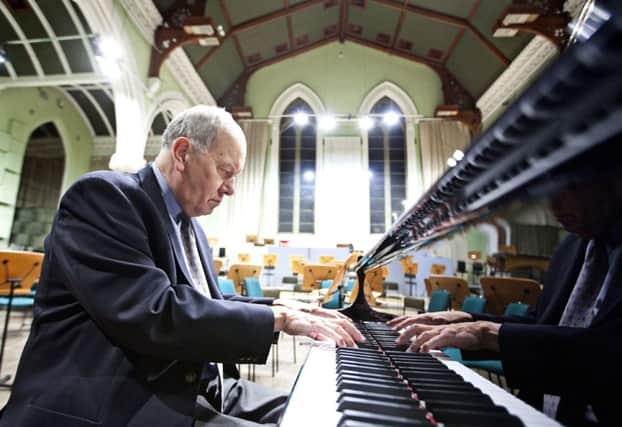‘Music continually offers new thoughts, new ideas’


He’s 70 in March, and it certainly doesn’t show. Instead, he’s part way through concurrent series of the complete Beethoven sonatas in London and Manchester, he still has a busy recital and concerto diary that takes him all over the globe, including this week’s birthday tribute performance of Brahms’ Piano Concerto No 1 with the RSNO, and he still talks about it all with the chirpy enthusiasm of a 21-year-old.
“That is the magic of music and getting older,” he says. “Music is continually offering new thoughts, new ideas. It keeps you younger. But so does enthusiasm.”
Advertisement
Hide AdThat’s the thing about Lill. In all the years I’ve enjoyed listening to his honest, thoughtful, unpretentious performances, and in all the conversations we’ve had, there has never once been a moment when you felt he was disillusioned with life or work. Not even in 2000, when he was mugged outside his Hampstead home by knife-wielding thugs who slashed his hand, jeopardising a piano-playing career that first took off in the early 1960s, even before his joint first prize triumph at the 1970 Tchaikovsky Competition in Moscow.
His first appearance with the RSNO was in the mid-1960s, from which sprang a relationship he holds in great affection – those early concerto performances, and the close, lasting friendship that arose with the late Sir Alexander Gibson clearly made quite an impression.
“There was never a dull moment with Alex,” he says. “He was a character and a half, amazingly modest, with so much to give. The best bits were the laughs we had after the concerts in a pub close to the City Halls”. That’s another thing about Lill: he sometimes seems like an ordinary, interesting guy with stories to tell and views to express over a pint.
Except he’s far from ordinary when it comes to expressing his art, a unique musicianship based on probing authority and instinctive thought, powered by a colossal expressive range that has enabled him to fathom the richest depths of the composers he most cherishes –Beethoven, Chopin, Brahms, Liszt, Rachmaninov, Prokofiev, Britten, but mostly Beethoven, whose sonatas fascinated him from the word go.
But it’s Brahms he brings to Scotland this week, a composer who should never be underestimated, despite the “bad press” he gets as someone gasping for creative breath in the wake of Beethoven. “At worst he was a great craftsman,” argues Lill. “But take the two piano concertos. These are truly glorious works – the first spontaneous, passionate and spring-like; the second, autumnal.”
Lill first tackled the earlier First Concerto when he was 14, after hearing Claudio Arrau perform it. “He was one of my Gods,” says Lill, who later got to know Arrau well, admiring him as much for his spontaneous pianism as for the fact he was “not at all full of himself as so many artists are”. Kindred spirits, it would seem.
Advertisement
Hide AdLill certainly believes in spontaneity dictating how a performance will pan out. “I don’t believe in anything self-consciously changing,” he says. “Whenever I perform a piece, it should be evolutionary and naturally convincing at that particular moment. That’s one reason I’m not crazy about recording CDs.
“Last Monday I played Beethoven’s Hammerklavier sonata, and realised I’d taken five minutes off my old speed. That’s why I don’t listen to my old recordings. They’re history, finished.” “Tempo is so important,” he adds. “It has always fascinated me. But it’s not about metronome markings. I’m more interested in the composer’s written Italian indications – whether, for instance, it’s presto or allegro.
Advertisement
Hide Ad“That gives the performer latitude to respond subconsciously to the time of day, the mood he is in, the different temperature or resonance of the hall. It all makes a difference in the live situation.”
It made a difference in 1995, when Lill was playing the Brahms First Concerto with the RSNO. “Someone in the orchestra was keen on timing performances. We’d played a couple of concerts before it came to Saturday in Glasgow, which coincided with the awful announcement that Alex Gibson had died. I wasn’t aware of playing the Brahms any differently that night, but apparently it took five minutes longer.”
Frankly, we shouldn’t care how long it takes him this week in Aberdeen, Edinburgh or Glasgow. Whatever the mood, whatever the occasion, however the wind blows, Lill’s gentlemanly presence is always a joy to behold. Many happy returns, John.
John Lill’s 70th birthday appearances with the RSNO are at Aberdeen Music Hall 30 January; Usher Hall Edinburgh on 31 January and Glasgow Royal Concert Hall 1 February, www.rsno.org.uk